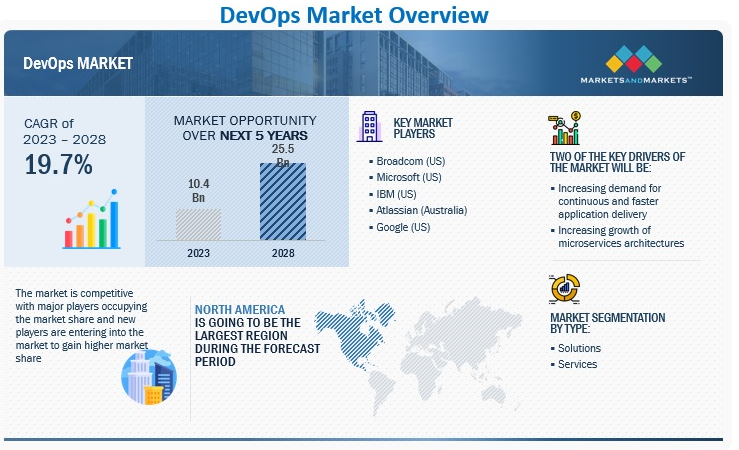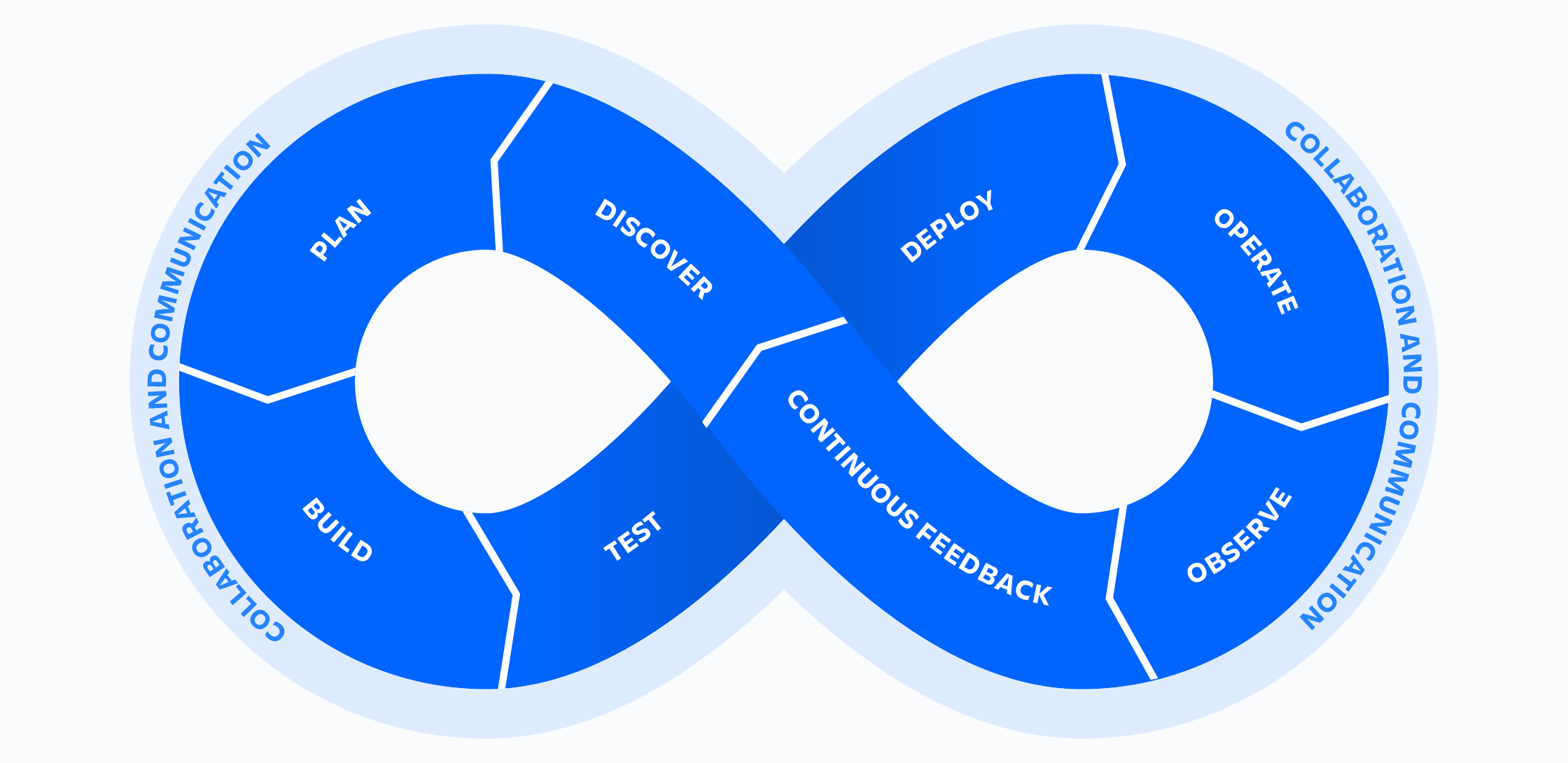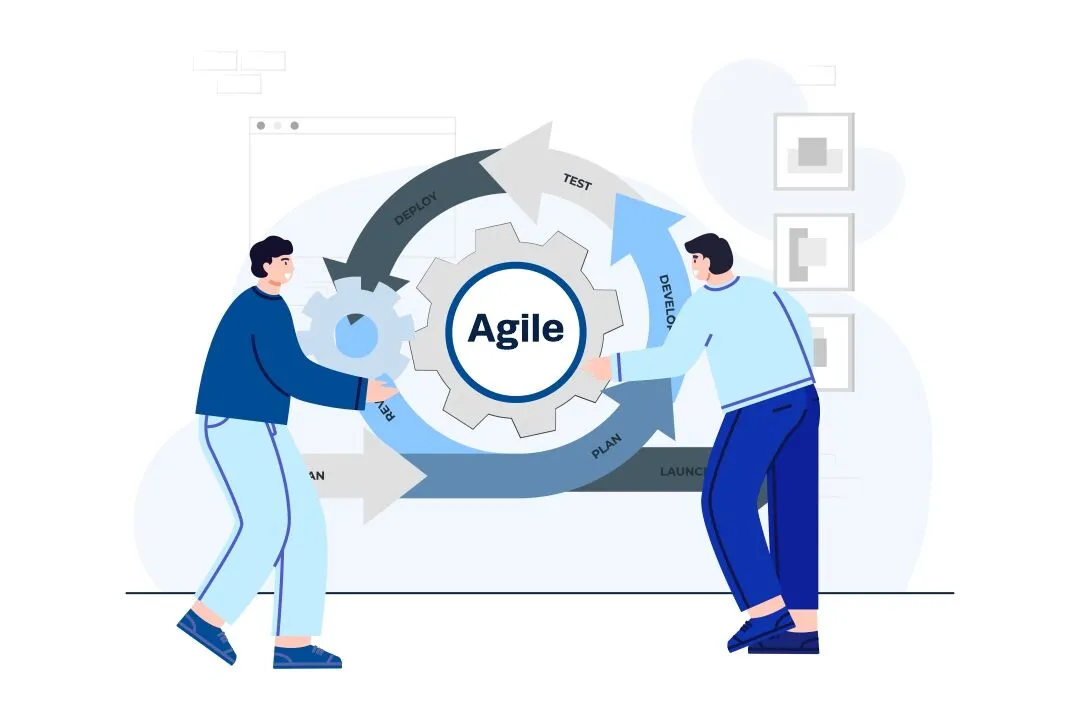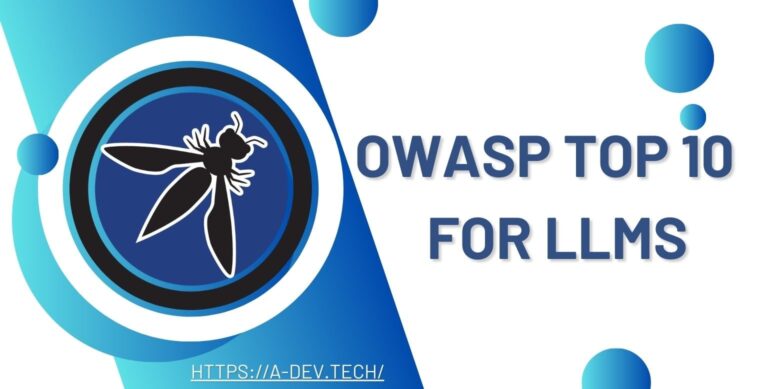In today’s dynamic business landscape, the adoption of DevOps best practices has emerged as an imperative for enterprises seeking to automate and streamline operations, enhance efficiency, and drive innovation in software development and IT operations. Reports from industry analyses underscore that organizations embracing DevOps methodologies witness notable advantages, including increased deployment frequency, reduced flaw rates in new releases, and expedited mean time to recovery during incidents.
Moreover, projections for the DevOps market forecast remarkable growth, indicating a robust Compound Annual Growth Rate (CAGR) of 19.7% spanning the forecast period. From an estimated value of USD 10.4 billion in 2023, the DevOps market is poised to soar to USD 25.5 billion by 2028. Rooted in the principles of agile software development and lean programming, DevOps methodologies burgeoned from grassroots initiatives within companies aimed at synchronizing the efforts of operations teams and developers.

At its core, DevOps champions the provision of enhanced business value to an organization’s clientele by emphasizing swifter, refined, and more secure outcomes. This value manifests in the form of more frequent product releases, features, or updates, characterized by the accelerated pace at which these updates reach end-users while upholding stringent standards of quality and security. Additionally, it encompasses the proficiency in swiftly detecting, rectifying, and re-releasing measures for identified issues or bugs.
To gain deeper insights into the evolving DevOps landscape, consider exploring the comprehensive analysis provided in the article “Unveiling DevOps in 2023: Exploring Trends, Industry Demands, and Future Perspectives.” This resource offers an in-depth overview of the latest trends, demands, and future trajectories within the realm of DevOps.
Nonetheless, the successful implementation of DevOps remains a challenge for many businesses. At A-Dev, our focus on DevOps practices extends beyond accelerating the speed of software delivery; we prioritize security, cohesion, and operational efficiency. (Explore our case study: [Case Study Link Here])
This article aims to delve into a comprehensive array of DevOps best practices crucial for optimizing operational workflows. Drawing from the experiences of our expert consultants, we will unveil techniques fostering seamless teamwork, automation, security, and performance enhancing within your development and operational processes. Let’s explore these transformative strategies together!
Unveiling Crucial DevOps Practices

DevOps practices encompass a diverse array of strategies and methodologies aimed at optimizing the software development process, enhancing teamwork, and ensuring efficient operational processes. Let’s explore these practices across different categories to understand their significance:
Customer-Centric Practices
Embedding customer-centric practices within DevOps methodologies represents a pivotal game-changer. Here, DevOps’ enhanced efficiency and agility in software development seamlessly intertwine with the customer-centric approach, ensuring the relevance and resonance of products and services with end-users. This transformative synergy within modern business operations sets the stage for unparalleled customer contentment.
Prioritize Customer Satisfaction
DevOps, by streamlining the release process, caters to the continuous demand from customers for upgrades and swift delivery of new functionalities. Through the seamless integration of code management and development tasks, DevOps expedites the deployment of novel features and benefits to customers. This streamlined approach significantly reduces response times, effectively meeting customer needs for rapid innovation and service enhancements.
The beauty of DevOps lies in its ability to ensure customer contentment, irrespective of the chosen software development process or methodology. Whether following the traditional waterfall model or embracing the holistic DevOps approach, meeting and surpassing customer expectations remains a constant goal.

Gathering Continuous Feedback
Gathering continuous feedback is a foundational DevOps practice that adapts to diverse customer expectations, providing crucial insights from direct customer experiences.
This practice equally emphasizes seeking feedback from transitioning employees, crucial for the A-dev team’s evolution into adopting the DevOps culture. Open communication channels foster collaboration and innovative thinking amid this transition.
Continuous feedback loops involving users, investers and other stakeholders, as well as team members serve as guiding beacons, determining improvement areas and nurturing a culture of perpetual learning and collaboration. The A-Dev team actively engages in these feedback mechanisms, leveraging insights to refine code quality and optimize development processes.
Synergizing Development and Operations Teams: Building a Collaborative Culture for DevOps Success
Cultivating a collaborative culture within a DevOps environment is fundamental to driving innovation, fostering communication, and achieving seamless amalgamation among cross-functional teams.Fostering collaboration within a DevOps culture not only involves active participation and alignment among collaborators but also relies significantly on the continuous feedback loop.
Participation of Active Stakeholders
Encouraging active involvement of participants from diverse departments is fundamental in DevOps. This practice cultivates alignment, transparency, and a collective effort and sense of responsibility toward shared organizational objectives. Involving stakeholders throughout the development and operational processes promotes a holistic view of projects, ensuring varied perspectives are integrated and fostering smoother collaboration and decision-making.

Build a Collaborative Culture
DevOps culture thrives on collaborative efforts and shared responsibilities among developers, operations personnel, and diverse stakeholders. It emphasizes breaking down silos, fostering cross-functional collaboration, and promoting a unified team approach. Effective communication, trust, continual learning, and a shared sense of accountability form the bedrock of this culture. Encouraging a growth mindset, embracing automation and efficient tools, and nurturing a collective ownership mindset throughout the application lifecycle are fundamental pillars of a successful DevOps culture.
DevOps Methodologies and Frameworks: Agile Project Management to Site Reliability Engineering
In the realm of DevOps, various methodologies and frameworks, such as Agile methodologies, play pivotal roles in optimizing workflows, fostering collaboration, and enhancing operational effectiveness.
Agile Project Management: Anchored in iterative development, flexibility, and adaptive planning, Agile Project Management stands as a vital component within the DevOps lifecycle. Employing methodologies such as Scrum and Kanban, it efficiently oversees and tracks project progress while integrating seamlessly into the broader spectrum of DevOps practices.

Lean Principles: Focuses on waste reduction and process optimization to streamline value distribution.
ITIL (Information Technology Infrastructure Library): Offers best practices for IT service management, emphasizing service lifecycle management and continual improvement.
Site Reliability Engineering (SRE): Applies software engineering to operational tasks to ensure scalable and reliable systems.
DevSecOps: Integrates security practices into the software creation lifecycle, emphasizing security within DevOps processes.
Continuous Integration/Continuous Deployment (CI/CD): Automation enabling seamless code integration and deployment, ensuring swift and reliable software distribution.
Software Development and Automation
Within the dynamic landscape of DevOps, Development and Automation play pivotal roles, reshaping the software delivery process. The integration of automated practices expedites key phases like integration, testing, and deployment, fostering a faster pace of innovation while upholding stringent software quality standards.
Continuous Integration and Continuous Delivery (CI/CD)
In DevOps, Continuous Integration (CI) and Continuous Delivery (CD) are pivotal. CI automates code integration and testing, ensuring a seamless blend of code changes into a shared repository. It’s the bedrock for CD, which takes charge of the final stages. CD orchestrates packaging code for swift and reliable deployment into any environment. This practice equips teams to trigger deployments manually or deploy them automatically, fostering agility and efficiency in software distribution.
Moreover, Continuous Deployment, an advanced step, automates validated code deployment into production, eliminating the need for manual intervention. By setting criteria for code releases, CD empowers organizations to swiftly deliver and integrate new features, responding promptly to user demands.
Crucially, while Continuous Integration operates independently, Continuous Delivery and Deployment rely fundamentally on CI’s bedrock. The robust deployment capabilities of CD pivot on CI principles—automated testing, code integration, and iterative updates. Together, these form an agile and responsive CI/CD pipeline, ensuring swift, reliable, and user-centric software development lifecycle.
Implement Test Automation
Automated testing, an essential component of DevOps methodologies, encompasses various testing strategies, including end-to-end, unit, integration, and performance testing. These automated tests play a crucial role in ensuring code functionality, identifying potential bugs, and enhancing software quality early in the development cycle. By detecting issues at their inception, this proactive testing approach significantly mitigates the chances of defects reaching the production stage, fostering a more robust and stable software product.

Integrating automation into development process significantly boosts productivity of both the development and operating teams, allowing teams to redirect their focus towards innovation rather than being consumed by labor-intensive manual tasks. This transition empowers development teams to expedite the delivery of top-tier software, meeting the dynamic demands of users and market expectations. The inclusion of automated testing within the CI/CD pipeline ensures thorough examination of software updates before deployment, thereby fortifying a seamless and resilient software delivery process.
Metrics, Monitoring, and Security
In any DevOps environment, monitoring and evaluating key metrics play a vital role in steering improvements. Keeping a watchful eye on Key Performance Indicators (KPIs) enables development and operations teams to make data-driven decisions and identify areas ripe for optimization. These DevOps metrics could include build success rates, deployment frequency, mean time to recovery (MTTR), and other relevant performance indicators tailored to the organization’s goals.
Change is an inherent part of software development, and managing it effectively is crucial. Integrated Change Management ensures that changes are handled systematically, minimizing risks of failures and disruptions. A well-orchestrated change management process guarantees smooth transitions across various stages of development and operations.
Observability within systems is critical for timely detection and resolution of issues. Comprehensive system monitoring provides real-time insights into application performance, allowing proactive identification and rectification of potential bottlenecks or faults. The ability to observe and analyze system behavior contributes significantly to maintaining robust and reliable software.
Security remains a paramount concern in DevOps. Embedding security measures throughout the development lifecycle is essential to mitigate risks and protect your organization against potential threats. Implementing Continuous Security practices ensures that security is not an afterthought but a constant consideration, safeguarding the software ecosystem at every stage of development and deployment
Technological Advancements
Embracing a Microservices architecture marks a pivotal shift in application design, offering unparalleled scalability, flexibility, and ease of maintenance of the development process. This modular approach allows software to be broken down into smaller, independently deployable services, enabling faster development cycles, simplified updates, and enhanced fault isolation.
Automated Dashboards powered by robust reporting and visualization tools present real-time insights into system performance metrics. These dashboards provide a comprehensive overview of key indicators, empowering production environments to make informed decisions swiftly and proactively address and detect potential bottlenecks or inefficiencies.
Leveraging the Right Tools in the DevOps ecosystem aligns with organizational objectives and ensures the effective execution of DevOps practices. Utilizing appropriate technologies and toolsets streamlines workflows, optimizes processes, and fosters a more collaborative and innovative production environment.
Embracing DevOps for Business Advancement
DevOps practices have become a transformative force, empowering businesses to achieve faster time-to-market, elevate product quality, monitor and enhance customer satisfaction, and boost team productivity. This strategic alignment of development with overarching business objectives renders DevOps a cornerstone in driving organizational growth and success.
At A-Dev, our dedication to DevOps approach has empowered operational excellence for numerous businesses. For instance, explore our page of customer testimonials, where clients have experienced significant improvements through the implementation of DevOps practices. Witness how businesses achieved a remarkable reduction in deployment time while simultaneously enhancing system reliability. These success stories showcase the transformative impact of our DevOps solutions on various industries.
Why Choose A-Dev for DevOps Implementation?
The A-Dev team comprises seasoned DevOps teams devoted to crafting tailored solutions that harmonize with your business’s unique needs. Our DevOps approach amalgamates expertise, cutting-edge technologies, and a client-centric ethos to fuel triumphant DevOps transformations.
As businesses navigate the ever-evolving landscape of software development and operational effectiveness, embracing DevOps best practices remains a pivotal strategy for achieving and sustaining success. The insights shared in this article aim to equip organizations with the requisite knowledge and devops tools vital for optimizing operational workflows, nurturing collaboration, and augmenting overall productivity.
While comprehending these DevOps best practices is imperative, executing them effectively often necessitates the expertise of skilled professionals. For those seeking to bolster their DevOps capabilities, our blog post “Hire DevOps Engineers | Professional & Experienced DevOps Developers in A-Dev Company” stands as a valuable resource. This comprehensive piece delineates strategies for acquiring the expertise of seasoned DevOps engineers, underscoring the pivotal role of a proficient team in driving triumphant DevOps best initiatives.
In summary, implementing DevOps methodologies empowers businesses to adeptly navigate and respond to the demands of an ever-evolving technological landscape. By fostering a culture entrenched in collaboration, automation, and continuous monitoring and improvement, organizations stand to achieve amplified efficiency, heightened resilience, and unparalleled innovation in their software development and operational endeavors.
FAQ
What are the key benefits of adopting DevOps best practices?
- Increased deployment frequency, reduced failure rates, faster recovery times, enhanced efficiency, collaboration, and innovation.
How fast is the DevOps market growing?
- The DevOps market is expected to grow at a CAGR of 19.7%, reaching USD 25.5 billion by 2028 from USD 10.4 billion in 2023.
Why is customer feedback important in DevOps?
- Continuous feedback ensures improved code quality, better user experience, faster issue resolution, and aligns development with user needs.
What methodologies are used in DevOps?
- Agile, Lean, ITIL, SRE, DevSecOps, and CI/CD for optimized workflows, collaboration, and reliable software delivery.






